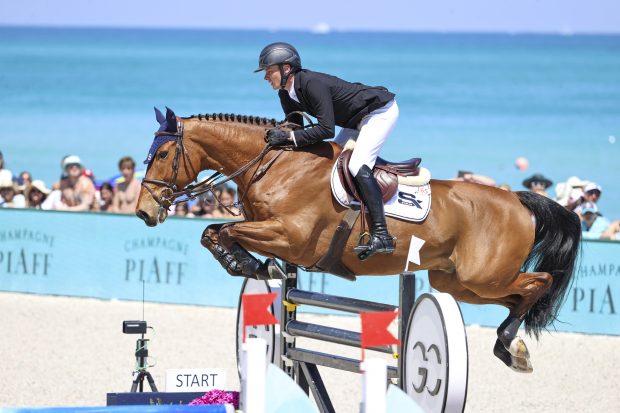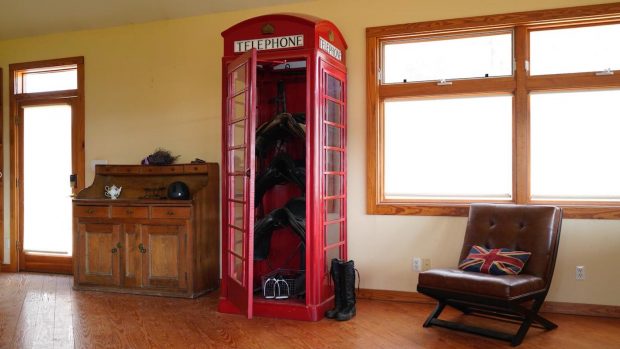US shows are taking precautions in light of an Equine Herpes Virus (EHV-1) case in the Ocala area of Florida.
Equestrian Sport Productions (ESP), which organises the Winter Equestrian Festival and Adequan Global Dressage Festival at venues in Wellington, around three hours south of Ocala, has taken action to protect horses on site.
There are currently no reported cases of EHV-1 in Wellington, and the case is not related to the neurological strain of EHV-1 currently affecting Europe.
“ESP has longstanding protocols to manage such events and will provide isolation facilities if and as required,” said a statement from the organisation.
“Experience has taught us that early identification is key when dealing with disease outbreaks, and this requires cooperation from everyone within the community.”
ESP is not accepting entries from horses who have not already competed at the festivals this year, until further notice.
While there are no known positive cases in Wellington, ESP is also restricting access to the Palm Beach International Equestrian Center and Equestrian Village, where the festivals are being held, to horses within Wellington.
Anyone travelling horses into these facilities will also be required to sign a declaration, stating the horses have not competed at other Florida venues and have not been in close contact with horses that competed in other Florida venues within 10 days prior to their arrival.
From Monday (8 March), horses arriving will need a health certificate, or statement on official licensed veterinarian letterhead, signed and dated by a vet within seven days of arriving. Find out more about what this health certificate must cover.
All horses on the showground must have their temperature taken twice daily, which will be recorded and is recommended to be posted on each horse’s stable door.
ESP and US Equestrian have also “strongly recommended” that equestrians do not ship horses throughout the state for the foreseeable future.
“In addition, we encourage you to cease any European imports you may have scheduled to Florida,” adds the ESP statement.
“We urge those with recently imported horses to isolate and monitor them for 10 days. Horses imported from Europe in the last 14 days and going forward will not be allowed into [the festival] show grounds.
“Given the seriousness of the EHV-1 outbreak in Europe (the case in Ocala is similar in nature but unrelated to the neurological strain of EHV-1 impacting Valencia, Spain, and other European countries), which has unfortunately resulted in multiple horse deaths, ESP implores everyone to do their part in order to keep your own horses safe, as well as those of your fellow competitors.
“Any horse on the show grounds with a fever of unknown origin or of suspicious origin must be reported to ESP management. It is always better to err on the side of safety. Isolation stalls will either be available on the grounds or at a local veterinary practice if the need arises.
“It is our shared responsibility to keep our horses safe.”
Article continues below…
You might also be interested in:

Equine herpes virus: all you need to know right now

EHV: British showjumpers must isolate on return from Europe

Subscribe to Horse & Hound this spring for great savings
Organisers are also urging all equestrians to take the following biosecurity measures:
- Take all horses’ temperature daily and report any horse with a temperature above 101.5 F or any signs of respiratory or neurological disease to your veterinarian and/or show management
- Take the temperature of all horses prior to shipping to the festivals, and do not bring any febrile horses (equines who have the virus, or are showing clinical signs) to the show
- Avoid mixing of horses where possible, practice equine “social distancing”
- Ensure good hygiene and biosecurity at the show and your home farms
- Make sure your horses are currently vaccinated for influenza and EHV. Under no circumstances should a horse that has been vaccinated compete within seven days.
- You should be able to document your horse’s normal temperature before arrival. Please do not ship horses with elevated temperatures. It is recommended that you establish a log of temperatures taken at least twice daily. If there is an elevated temperature for more than a 24-hour period, please consult your local veterinarian immediately
- Every effort should be made to minimise stress and commingling of horses shipped long distances. Extra hours on a horse van or moving from stable to stable is the fastest way to compromise your horses’ and your neighbour’s horses’ health
- Please take the time to review equine good hygiene practices and impress its importance to your grooms and barn managers in everyday care
Horse & Hound magazine, out every Thursday, is packed with all the latest news and reports, as well as interviews, specials, nostalgia, vet and training advice. Find how you can enjoy the magazine delivered to your door every week, plus options to upgrade to access our H&H Plus online service which brings you breaking news as it happens as well as other benefits.



